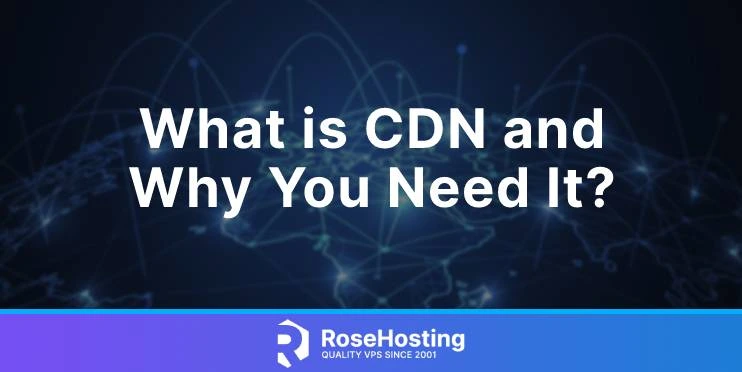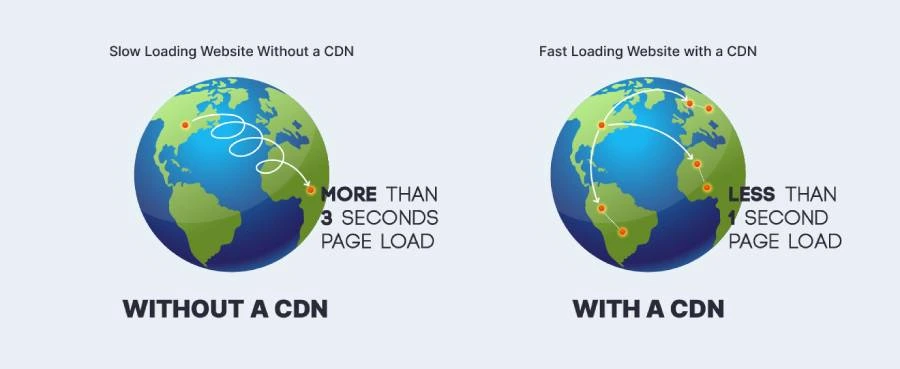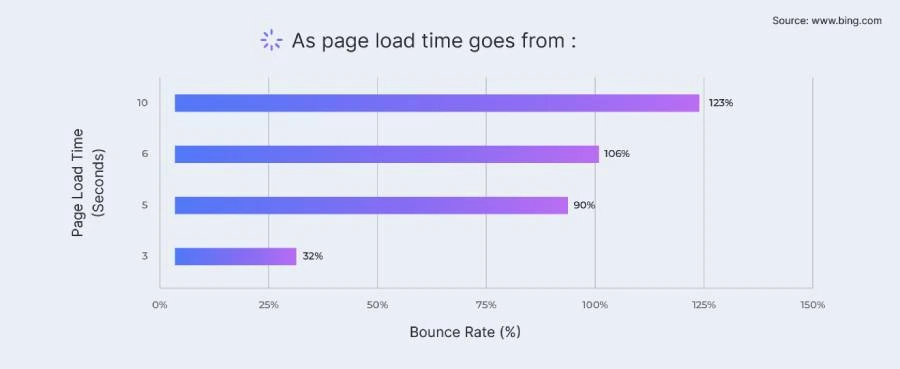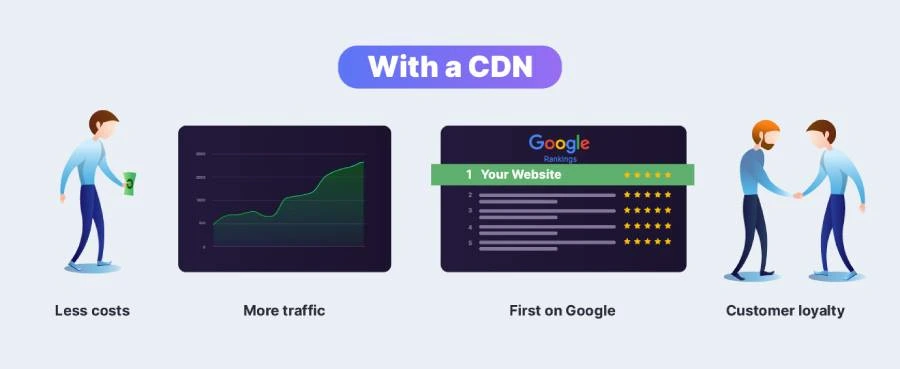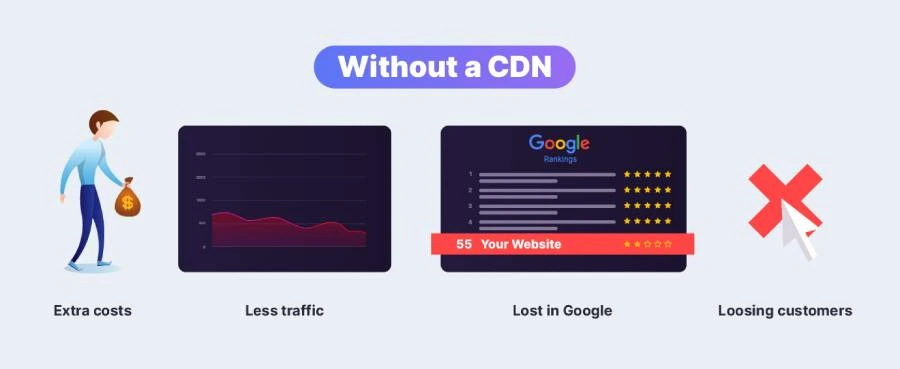Google indicated that they emphasize page load speed in their SEO rankings. What’s more, a site that loads in 1 second has a 5x higher conversion rate than a site that loads in 10 seconds.
This means that for 9 seconds of work you stand to make 5x the revenue!
Well, don’t quote us just yet as the math on that might not be exact, but hopefully you can see how crucial page load speed is to any modern business website.
This is where a Content Delivery Network (CDN) comes in. An essential factor for business website performance.
Table of Contents
So, exactly what is a CDN?
A Content Delivery Network is a distribution of servers that lets your website’s content load much quicker for all users worldwide, regardless of their location.
CDN management software clearly calculates which server is close to the user to deliver content significantly faster. Since your server can have one physical location, people that try to access your site from another continent will have much slower load times than those that live closer to your server.
Customer expectations continue to increase with each technological advancement becoming commonplace. In effect this forces you to improve your or get left behind by your competitors. Utilizing a content delivery network to decrease your page load times to less than a second helps you maintain an edge, by improving SEO and increasing site traffic. Best of all, this also allows you to establish long-term customer loyalty, minimizes missed conversion opportunities and can even reduce your business costs through lower bandwidth consumption.
If you’re unsure how to take advantage of speeding up your site, RoseHosting can advise you on what to do on your existing site to speed it up, and does so free of charge for all of their customers.
These CDN data centers store copies of specific data, such as images and web files on their edge servers, spread out across the world. This allows your website visitors to access these files much more quickly, regardless of their physical location. Therefore, CDNs provide a consistent user experience, enhanced website speed, increased traffic and higher conversion rates. Simply put, your potential website visitor should become a customer and not bounce back through Google to one of your competitors with a better-performing website. A fast server, optimized code and a CDN are the optimal solution.
Why Use a CDN?
Website owners and large companies use a CDN mainly to allow visitors to access their website quickly and easily. The primary purpose of a content delivery network is to provide those visitors with a pleasant user experience. So what does this all mean to you?
Think of it this way, when hundreds of thousands of people around the world try to access a single page on your site, your server can become overburdened and even fail entirely, taking your website down. This not only leaves a really bad tastes for those visitors that experience the site downtime, but can also have negative implications on your SEO rankings.
A CDN absorbs excess traffic and spread it across distributed edge servers, which simultaneously gives your visitors a superior experience and keeps your site up.
In addition, using a CDN can ensure site stability and better security. As a result many global companies that use a CDN include eCommerce sites, cloud computing, hosting and gaming companies, as well as entertainment websites and business owners who want to establish a consistent and reliable online presence.
Key Factors to Consider When Choosing a CDN
Depending on the competitive nature of your industry, a CDN alone might not be sufficient to break onto the first page of Google. Worse still, there are paid CDN service that will cost you both time and money and still won’t meet your needs. You should consider the following factors when choosing the right CDN for your website:
Define why you need a CDN
If you do no run of a large corporation or are on a tighter budget, you can still go with the best CDN hosting provider that offers a free CDN. These can be limiting for certain businesses however, so check if those same providers offer reasonably priced pro plans with full features.
Define What Kind of Features You Need
Consider the main features, such as web filtering, smart image optimization, user interface, SEO benefits, cache control, SSL coverage, integration with WordPress (if you use it), and how easy it is to set up a CDN. If you go with a fully-managed provider, they will install everything for you.
Pay Attention to Performance
Make sure to check if a CDN performs in delivering quick page load times and if it supports both static and dynamic content.
Check out Customer Support and Pricing Plans
The best CDN providers offer exceptional customer support and affordable prices. Check if your CDN provider offers multi-language support, for example.
Consider if PoP Locations are Close to Your Audience
Pay close attention to where your potential customers are located because choosing a CDN that manages PoP locations close to them significantly impacts the overall CDN performance.
Trust and Safety
CDN services that are open to requests from law enforcement need to have transparency reports which can be checked on their official websites. The Cloudflare transparency report is a good example.
Benefits of Using a CDN
Reduced Latency & Improved Speed
Latency refers to the time data travels from the server to the user’s device. The distance between the server and the user significantly affects latency.
A Content Delivery Network reduces latency by caching content (temporarily storing copies of your website files) on a network server closer to the user. This simply results in a faster page load time.
Lower Bandwidth Consumption Leads to Cost Savings
Simply put, when your network’s bandwidth usage is high, your network performance can easily drop. This means that to keep your site up, you have to upgrade to a plan with more resources, and your web hosting costs can significantly increase.
However, that should not be the case if you take advantage of CDN servers because they can help you maintain better control of web hosting costs. They can reduce bandwidth demands on origin servers, which means that website traffic is split over multiple CDN edge servers.
Improved SEO Rankings & Website Visibility
If you have basic SEO knowledge, you already know that page speed is essential to Google’s algorithm. Efficient content delivery, page speed, and overall user experience are vital for your SEO rankings.
Since CDNs distribute your content through server proxies, your website will likely rank higher organically. Your improved SEO rankings will also increase your website’s visibility, which will help you reach new customers and boost revenue.
Enhanced Site’s Security
A CDN provides an added layer of security by offering services such as blocking features for DDoS protection, firewalls, and DNS monitoring. In other words, a CDN ensures balanced traffic loads and secure transcription.
Keep in mind that free CDN plans offer limited security features. With a fully managed provider, maintenance and website security come stock standard with your fully managed hosting plans. You should also get an SSL certificate to enhance your site’s security, and a quality provider will give you one for free with every domain name you buy.
Increased Customer-Loyalty
Asides from the aforementioned technical benefits, an additional practical element is an improved user experience. A CDN and an SSL certificate might not bring in more customers, but not having them will surely lead to higher visitor bounce rates due to slower page load times and warning pop-ups about site security.
Drawbacks of Using a CDN
Issues With Implementation
Some CDNs are not as simple to set up, meaning that you may require a developer when integrating a CDN into your website. A fully-managed provider however will take care of this for you, saving you both time and a potential expense in hiring a developer.
Extra Cost
A paid CDN naturally incurs additional charges though the cost will depend on the number of visitors, website resources, and the number of requests your CDN gets. As mentioned before however, this cost can be offset or even negated entirely by not having to upgrade to a hosting plan with more local resources.
Mismatch Between Server’s Location
Pay special attention to your audience location. This is important because if CDN servers are located near them, they will be much more efficient in delivering content faster. For example, if you have a local-only Seattle-based business, you don’t need a CDN located in Europe and Asia.
Customer Support Constraints
First and foremost, you won’t experience customer support issues if your web hosting service can optimize and fine-tune your CDN hosting setup for the highest possible speed and efficiency. Unlimited managed support is, therefore, a must if you want to save your time and energy.
Free vs Premium CDN: Which One Should You Use?
The more features you expect, the more expensive a CDN can get. In terms of content delivery network prices, the cost of this service will depend on your website’s unique purpose and needs.
Choose a FREE content management system to speed up your website if:
· Your website is only targeting a local audience
· You own a small to medium website with reasonable traffic
· You are on a tighter budget
· You only need basic CDN functionality
· You are not looking to grow your business through your website
Choose a PREMIUM content management system to speed up your website if:
· You have visitors from across the globe
· You have a large website or several sites
· You care about improved speed functionality and mobile load times
· You need better features, such as advanced analytics
· You want to mitigate potential security loopholes
· You want advanced image optimization
· You want functional built-in caching capabilities
Bringing it all Together
One thing is for certain. If you have ever thought about boosting your website’s performance and traffic, a CDN is an obvious choice.
As we have seen, the most significant advantages of using a CDN are improved website speed, enhanced site security, and boosted rankings. We have also covered the potential minor drawbacks of a CDN, such as extra running costs, location mismatch, implementation issues, etc. to help you better understand this system as a whole.
So how do you go about speeding up your website to convert your visitors into customers and appease the Google robot overlords?
Questions You Really Want to Ask
What is a content delivery network?
A Content Delivery Network (CDN) is a distribution of servers that lets various websites’ content load much quicker for all users across the world, no matter where they are. Therefore, CDN management software calculates which server is closest to the user in order to deliver content quickly. So, the main purpose of a CDN is that people around the world can access websites more rapidly and have a pleasant user experience, while website owners can become more successful in their business growth.
Why use a CDN?
Using a CDN is essential if you strive for improved website performance. You can establish long-lasting customer relationships by allowing visitors to access your website quickly. Moreover, using a CDN can enhance website traffic and better conversion rates.
What does CDN error mean?
A CDN error means that CDN edge servers cannot reach your origin server. You can solve this by disabling your firewall because you cannot use a CDN and a firewall simultaneously.
What are the best content delivery network providers?
The best content delivery network providers are: Cloudflare, Fastly, StackPath, Akamai, and KeyCDN.
